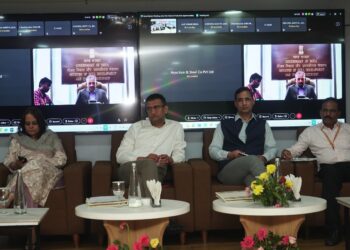Companies can help bridge the skill gap by offering vocational training, apprenticeships, and certification programs to the underprivileged sections of society.
By Ketan Deshpande
Introduction
India is a country with a population of over 1.3 billion people, making it the second-most populous country in the world. With most of the population under the age of 35, India has the potential to become a global powerhouse if its citizens are skilled and equipped with the necessary tools to contribute to the economy. An educated and skilled population is essential for creating, sharing, and using knowledge, which is crucial for the progress of societies and economies.
The education and skilling system should focus on practical and application-based learning to better prepare students for the workforce. The government and CSR institutions should create a pro-innovation environment and individuals and organizations should invest in developing skills in areas like IT, healthcare, renewable energy, and manufacturing to improve employment opportunities.
According to the recent report titled “Skills Strategies for a Strong, Sustainable and Balanced World of Work.”, India will require 30 million digitally skilled professionals by 2026 and 50% of the current workforce will need to re-skill themselves in emerging technologies. 2023-24 Union Budget has focused on youth, their skill enhancement and job creation, and the strengthening of the macroeconomy.
Challenges in Skilling
Let me talk first challenges India facing in skill development. India is facing numerous challenges in skill development that are hindering its efforts to create a skilled workforce. One of the major challenges is the lack of quality infrastructure and training facilities in many parts of the country.
This is particularly prevalent in rural areas where access to education and vocational training is limited. Also, there is a low level of industry-academia collaboration, resulting in a skills gap between the skills demanded by industry and those provided by educational institutions and training providers.
Furthermore, there is insufficient investment in skill development programs and initiatives, as well as a lack of focus on soft skills and behavioral training, which are essential for employability and career advancement. The availability of trainers and assessors with relevant skills and qualifications is also limited, and there is an inefficient and fragmented skill certification system that leads to a lack of recognition and mobility for skilled workers. Addressing these challenges is crucial for India to develop a skilled workforce that can compete in the global economy.
Pillars for skill nation
Let me outline the four pillars to be a skilled nation. To make India a skill country, there are four pillars that must be addressed: education, employment, entrepreneurship, and innovation.
Education
Education is the foundation of any skilled workforce. India’s education system needs to evolve to match the needs of a modern economy. The current education system in India is primarily focused on rote learning and theory-based education, which does not necessarily prepare students for the practical world. To make India a skill country, the education system needs to shift towards a more practical and application-based model. The Indian society needs to invest in vocational training programs to provide students with the necessary skills for various industries.
Employment
The second pillar is employment. The government needs to create an environment that is conducive to job creation. The country’s economic growth is dependent on job creation, and the government must ensure that there are enough job opportunities available for the country’s young population. The government should focus on promoting industries that have a high potential for employment generation, such as manufacturing and service industries. The government, corporate and academia should also encourage the private sector to invest in these industries.
Entrepreneurship
Entrepreneurship is the third pillar that will help make India a skill country. The government needs to create an environment that is conducive to entrepreneurship. This can be done by providing easy access to funding, simplifying regulations and policies, and offering tax incentives to startups. The government, corporate and academia jointly should also focus on promoting entrepreneurship at the grassroots level by providing training and mentoring programs for aspiring entrepreneurs.
Innovation
The fourth and final pillar is innovation. Innovation is crucial to the growth of any economy, and India is no exception. The government needs to create an environment that fosters innovation by providing funding, tax incentives, and other forms of support to startups and research and development initiatives. The government should also encourage the private sector to invest in innovation and collaborate with academic institutions to promote research and development.
Opportunity ahead
India has several opportunities for skilling, particularly in areas such as information technology, healthcare, renewable energy, and manufacturing. The government has launched various initiatives, such as the Skill India Mission, to provide skill training to the country’s youth and improve their employability. Additionally, there is a growing demand for skilled professionals in areas such as data science, artificial intelligence, and cybersecurity. Overall, there are several avenues for individuals and organizations to invest in skilling in India, which can lead to enhanced job opportunities and economic growth.
Conclusion
In summary, making India a skilled country requires a multi-faceted approach. The government, educational institute and businesses collectively needs to focus on education, employment, entrepreneurship, and innovation to create an environment that is conducive to the growth of a skilled workforce. By investing in these four pillars, India can build a workforce that is competitive on the global stage, create new job opportunities, and drive economic growth.
About the Author

Ketan Deshpande is one of the top leaders working in India for skilling youth. He is Founder Chairman & CEO of FUEL – Friends Union For Energising Lives and Visiting Fellow JBS University of Cambridge UK.
Views are personal.
Also Read: Dr. Kalam inspired me to reach 1 million youths: Ketan Deshpande – India CSR
Also Read: India: The Potential Skill Capital of the World by Ketan Deshpande I India CSR
📢 Partner with India CSR
Are you looking to publish high-quality blogs or insert relevant backlinks on a leading CSR and sustainability platform? India CSR welcomes business and corporate partnership proposals for guest posting, sponsored content, and contextual link insertions in existing or new articles. Reach our highly engaged audience of business leaders, CSR professionals, NGOs, and policy influencers.
📩 Contact us at: biz@indiacsr.in
🌐 Visit: www.indiacsr.in
Let’s collaborate to amplify your brand’s impact in the CSR and ESG ecosystem.





























